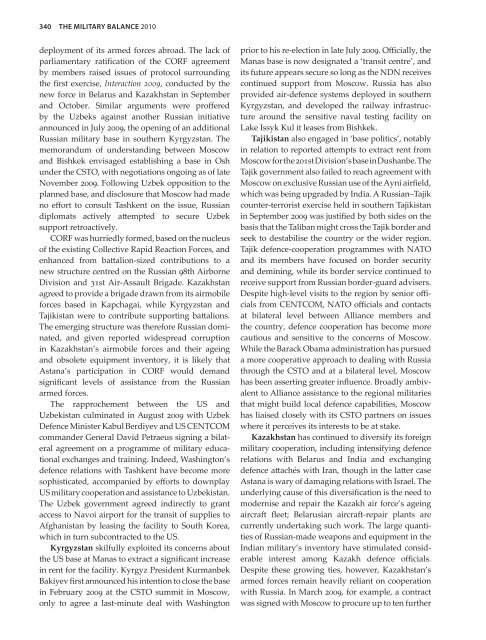Create successful ePaper yourself
Turn your PDF publications into a flip-book with our unique Google optimized e-Paper software.
340 The MiliTAry BAlAnCe 2010<br />
deployment of its armed forces abroad. The lack of<br />
parliamentary ratification of the CORF agreement<br />
by members raised issues of protocol surrounding<br />
the first exercise, Interaction 2009, conducted by the<br />
new force in Belarus and Kazakhstan in September<br />
and October. Similar arguments were proffered<br />
by the Uzbeks against another Russian initiative<br />
announced in July 2009, the opening of an additional<br />
Russian military base in southern Kyrgyzstan. The<br />
memorandum of understanding between Moscow<br />
and Bishkek envisaged establishing a base in Osh<br />
under the CSTO, with negotiations ongoing as of late<br />
November 2009. Following Uzbek opposition to the<br />
planned base, and disclosure that Moscow had made<br />
no effort to consult Tashkent on the issue, Russian<br />
diplomats actively attempted to secure Uzbek<br />
support retroactively.<br />
CORF was hurriedly formed, based on the nucleus<br />
of the existing Collective Rapid Reaction Forces, and<br />
enhanced from battalion-sized contributions to a<br />
new structure centred on the Russian 98th Airborne<br />
Division and 31st Air-Assault Brigade. Kazakhstan<br />
agreed to provide a brigade drawn from its air mobile<br />
forces based in Kapchagai, while Kyrgyzstan and<br />
Tajikistan were to contribute supporting battalions.<br />
The emerging structure was therefore Russian dominated,<br />
and given reported widespread corruption<br />
in Kazakhstan’s airmobile forces and their ageing<br />
and obsolete equipment inventory, it is likely that<br />
Astana’s participation in CORF would demand<br />
significant levels of assistance from the Russian<br />
armed forces.<br />
The rapprochement between the US and<br />
Uzbekistan culminated in August 2009 with Uzbek<br />
Defence Minister Kabul Berdiyev and US CENTCOM<br />
commander General David Petraeus signing a bilateral<br />
agreement on a programme of military educational<br />
exchanges and training. Indeed, Washington’s<br />
defence relations with Tashkent have become more<br />
sophisticated, accompanied by efforts to downplay<br />
US military cooperation and assistance to Uzbekistan.<br />
The Uzbek government agreed indirectly to grant<br />
access to Navoi airport for the transit of supplies to<br />
Afghanistan by leasing the facility to South Korea,<br />
which in turn subcontracted to the US.<br />
Kyrgyzstan skilfully exploited its concerns about<br />
the US base at Manas to extract a significant increase<br />
in rent for the facility. Kyrgyz President Kurmanbek<br />
Bakiyev first announced his intention to close the base<br />
in February 2009 at the CSTO summit in Moscow,<br />
only to agree a last-minute deal with Washington<br />
prior to his re-election in late July 2009. Officially, the<br />
Manas base is now designated a ‘transit centre’, and<br />
its future appears secure so long as the NDN receives<br />
continued support from Moscow. Russia has also<br />
provided air-defence systems deployed in southern<br />
Kyrgyzstan, and developed the railway infrastructure<br />
around the sensitive naval testing facility on<br />
Lake Issyk Kul it leases from Bishkek.<br />
Tajikistan also engaged in ‘base politics’, notably<br />
in relation to reported attempts to extract rent from<br />
Moscow for the 201st Division’s base in Dushanbe. The<br />
Tajik government also failed to reach agreement with<br />
Moscow on exclusive Russian use of the Ayni airfield,<br />
which was being upgraded by India. A Russian–Tajik<br />
counter-terrorist exercise held in southern Tajikistan<br />
in September 2009 was justified by both sides on the<br />
basis that the Taliban might cross the Tajik border and<br />
seek to destabilise the country or the wider region.<br />
Tajik defence-cooperation programmes with NATO<br />
and its members have focused on border security<br />
and demining, while its border service continued to<br />
receive support from Russian border-guard advisers.<br />
Despite high-level visits to the region by senior officials<br />
from CENTCOM, NATO officials and contacts<br />
at bilateral level between Alliance members and<br />
the country, defence cooperation has become more<br />
cautious and sensitive to the concerns of Moscow.<br />
While the Barack Obama administration has pursued<br />
a more cooperative approach to dealing with Russia<br />
through the CSTO and at a bilateral level, Moscow<br />
has been asserting greater influence. Broadly ambivalent<br />
to Alliance assistance to the regional militaries<br />
that might build local defence capabilities, Moscow<br />
has liaised closely with its CSTO partners on issues<br />
where it perceives its interests to be at stake.<br />
Kazakhstan has continued to diversify its foreign<br />
military cooperation, including intensifying defence<br />
relations with Belarus and India and exchanging<br />
defence attachés with Iran, though in the latter case<br />
Astana is wary of damaging relations with Israel. The<br />
underlying cause of this diversification is the need to<br />
modernise and repair the Kazakh air force’s ageing<br />
aircraft fleet; Belarusian aircraft-repair plants are<br />
currently undertaking such work. The large quantities<br />
of Russian-made weapons and equipment in the<br />
Indian military’s inventory have stimulated considerable<br />
interest among Kazakh defence officials.<br />
Despite these growing ties, however, Kazakhstan’s<br />
armed forces remain heavily reliant on cooperation<br />
with Russia. In March 2009, for example, a contract<br />
was signed with Moscow to procure up to ten further


